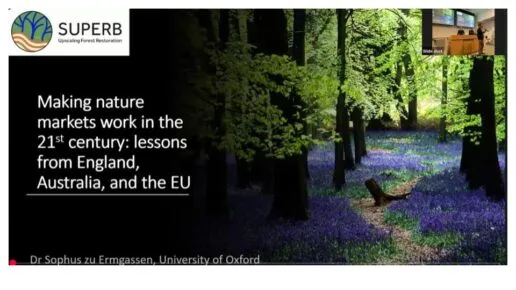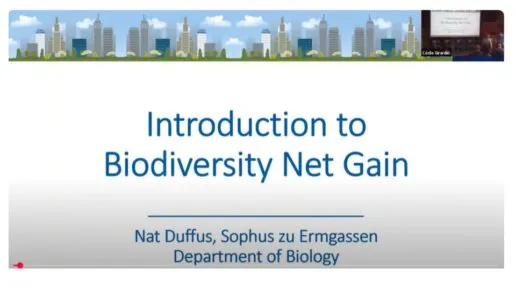About
Biodiversity net gain (BNG) is mandatory legislation in England designed to that aims to compensate for the biodiversity loss caused by development projects. The UK government describes the scheme as follows:
Biodiversity net gain ( BNG ) is a way of creating and improving natural habitats. BNG makes sure development has a measurably positive impact (‘net gain’) on biodiversity, compared to what was there before development.
BNG is not without controversy. There are multiple examples of it leading to perverse outcomes, failing to do what it was intended to do and suffering from a lack or resources to sufficiently regulate. There are also a number of vibrant habitats that have been created in part due to funding (or the prospect of funding) from BNG. A good overview of some of the issues and controversies with BNG are outlined in these podcasts:
At its heart, a scheme that intends to have a positive impact on biodiversity is credible but as with so many market-driven approaches there are numerous challenges in making these schemes work effectively . Oxford University has published a wide range of research outputs relating the Biodiversity Net Gain. The team at the Leverhulme Centre for Nature Recovery have undertaken the project to coordinate this research and reach out to internal and external partners so as to bring together a diverse set of voices and understand how this scheme could be incrementally improved over time. The Centre is also promoting discussions with research teams that feel more radical overhauls may be required. At its heart, BNG frames a challenging question: in a world where new housing, workplaces and other land use needs are deemed essential; is it possible to provide this infrastructure without Nature bearing the brunt of the costs?
Related Projects

Financing local nature recovery in Oxfordshire
Understanding the scale of the opportunity to fund nature recovery with offsite Biodiversity Net Gain (BNG) payments.

Rethinking the role of state institutions in nature recovery
In England there has been a long-term trend towards the retrenchment of direct state spending and the role of government in nature conservation policy – what could an alternative vision for the state look like?
Related Outputs
What is Biodiversity Net Gain?
On February 12th, England’s ambitious new environmental policy, Biodiversity Net Gain (BNG) went live. Underpinned by the Environment Act, this policy lays out the mandatory requirement for new developments to provide a 10% net gain in biodiversity, maintained for at least 30 years. For now, this applies to almost all developments, and will become mandatory […]
Improving the ecological outcomes of compensatory conservation by addressing governance gaps: a case study of Biodiversity Net Gain in England
Biodiversity compensation policies have emerged around the world to address the ecological harms of infrastructure expansion, but they have historically experienced weak compliance. The English government is introducing a requirement that all new infrastructure developments demonstrate they achieve a Biodiversity Net Gain (BNG). Previous research has highlighted governance gaps that risk undermining the policy’s ecological […]
The current state, opportunities and challenges for upscaling private investment in biodiversity in Europe
European countries have committed to ambitious upscaling of privately funded nature conservation. We review the status and drivers of biodiversity finance in Europe. By implementing semistructured interviews with 25 biodiversity finance key informants and three focus groups across Europe, we explore opportunities and challenges for upscaling private investment in nature. Opportunities arise from macroeconomic and […]
Nature Series Seminar: Making nature-markets work in the 21st century: evidence from England, Australia, and the EU
There is a global biodiversity funding gap, and rapid efforts to mobilise private funding to fill this gap. Attempts to commodify biodiversity to create markets and harness return-seeking investment into conservation have now been practiced for half a century. What have we learned about how or whether private finance can become part of the solution, […]
Biodiversity offsets perform poorly for both people and nature, but better approaches are available
Highlights • Local planning constraints deliver poor biodiversity net gain (BNG) offsets • Removing those constraints results in significant BNG improvements • Alternatively, offsets can deliver gains in environmental access
‘Nature positive’ must incorporate, not undermine, the mitigation hierarchy
For the concept of nature positive to succeed as the lodestar for international action on biodiversity conservation, it must build upon lessons learned from the application of the mitigation hierarchy — or risk becoming mere greenwash.
PREPRINT: Biodiversity credits: learning lessons from other approaches to incentivize conservation
Biodiversity credits are an emerging vehicle for pro-environmental financing. Here we define and delimit biodiversity credits and explore the pathways through which credits can be issued. We scrutinize early evidence from pilots and suggest lessons from other market-based incentives for conservation and climate mitigation, including biodiversity offsets and forest carbon credits that have attracted large […]
Nature Seminar Series. In search of the holy grail – the one true biodiversity metric. E.J. Milner-Gulland
Signatories to the Convention on Biological Diversity’s Global Biodiversity Framework promised to work towards halting and reversing the loss of biodiversity by 2030 – a bold mission, and one which has a plethora of sub-targets and indicators associated with it. How these indicators will scale from local to global and how they can be aggregated […]
What is a Unit of Nature? Measurement Challenges in the Emerging Biodiversity Credit Market
There is growing interest in developing generalisable, standardised measurements of biodiversity, in particular to help the business and financial sectors to quantify biodiversity impacts. In their recent paper, Dr Hannah Wauchope and colleagues created a framework to explain how such units are defined in the rapidly growing voluntary biodiversity credits market. In this seminar, Hannah […]
Navigating uncertainty in LCA-based approaches to biodiversity footprinting
The use of Life cycle assessment (LCA) methods is rapidly expanding as a means of estimating the biodiversity impacts of organisations across complex value chains. However, these methods have limitations and substantial uncertainties, which are rarely communicated in the results of LCAs. Drawing upon the ecological and LCA literature on uncertainty and two worked examples […]
Evaluating the impact of biodiversity offsetting on native vegetation
Biodiversity offsetting is a globally influential policy mechanism for reconciling trade-offs between development and biodiversity loss. However, there is little robust evidence of its effectiveness. We evaluated the outcomes of a jurisdictional offsetting policy (Victoria, Australia). Offsets under Victoria’s Native Vegetation Framework (2002–2013) aimed to prevent loss and degradation of remnant vegetation, and generate gains […]
Mission-Oriented Public Policy for Nature Recovery
This paper outlines the findings of an expert workshop exploring how policies for delivering nature recovery relate to the policy toolkit applied in mission-oriented strategy, and demonstrate how missions-thinking can be applied to nature recovery in England.
Consultation response: a biodiversity metric for Scotland’s planning system
This response highlights how a biodiversity metric could support Scotland’s unique habitats and nature. It brings together evidence from the application of a statutory biodiversity metric in England to recommend a revised approach for a Scottish context. It draws on evidence from across the Leverhulme Centre for Nature Recovery’s research community.
Exploring the ecological outcomes of mandatory biodiversity net gain using evidence from early-adopter jurisdictions in England
Net outcome-type biodiversity policies are proliferating globally as perceived mechanisms to reconcile economic development and conservation objectives. The UK government’s Environment Bill will mandate that most new developments in England demonstrate that they deliver a biodiversity net gain (BNG) to receive planning permission, representing the most wide-ranging net outcome type policy globally. However, as with […]
Incorporating local nature-based cultural values into biodiversity No Net Loss strategies
Achieving “No Net Loss” (NNL) of nature from a development typically requires projects to follow a ‘mitigation hierarchy’, by which biodiversity losses are first avoided wherever possible, then minimised or remediated, and finally any residual impacts offset by conservation activities elsewhere. Biodiversity NNL can significantly affect people, including their cultural values. However, empirical research is […]
Importance of Baseline Specification in Evaluating Conservation Interventions and Achieving No Net Loss of Biodiversity
When setting objectives for conservation activities, or judging their efficacy after implementation, an appropriate frame of reference against which evaluation is made should be specified. We developed 2 models to investigate the implications of setting different frames of reference in regions subject to various biodiversity trends and anthropogenic impacts.
No net loss for people and biodiversity
Badly planned offsets can exacerbate poverty, and development and offset impacts can vary across spatial-temporal scales and by location, gender, and livelihood. We conceptualize the no-worse-off principle in the context of NNL of biodiversity, by exploring for whom and how the principle can be achieved.
Nature Seminar Series. Phantom credits why rainforests offsets are not working – Patrick Greenfield
In January 2023, a joint investigation by the Guardian, Die Zeit and Source Material found that the forest carbon offsets approved by the world’s leading certifier and used by major corporations for climate claims are largely worthless. Patrick Greenfield, one of the reporters on the investigation, will detail the story of their investigation and discuss […]
The Environmental Benefits from Nature Tool – Beta Test Version
The Environmental Benefits from Nature tool is designed to work alongside Biodiversity metric 3.0 and provide developers, planners and other interested parties with a means of enabling wider benefits for people and nature from biodiversity net gain.
A menu of standards for green infrastructure in England: effective and equitable or a race to the bottom?
To help local authorities deliver high quality, multifunctional GI that meets local needs as well as national priorities, Natural England has been developing a framework of GI Principles and Standards in partnership with a broad range of researchers and practitioners.




